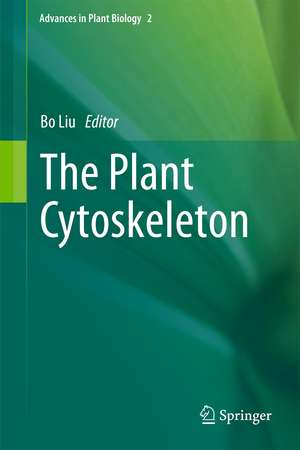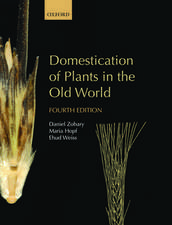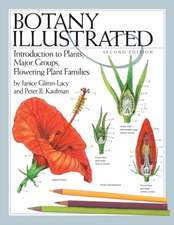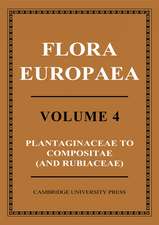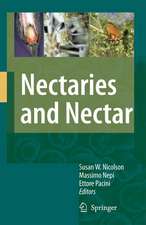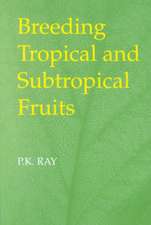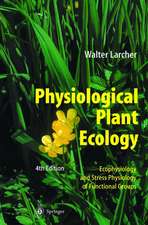The Plant Cytoskeleton: Advances in Plant Biology, cartea 2
Editat de Bo Liuen Limba Engleză Paperback – 27 dec 2012
| Toate formatele și edițiile | Preț | Express |
|---|---|---|
| Paperback (1) | 946.87 lei 6-8 săpt. | |
| Springer – 27 dec 2012 | 946.87 lei 6-8 săpt. | |
| Hardback (1) | 951.29 lei 6-8 săpt. | |
| Springer – 24 noi 2010 | 951.29 lei 6-8 săpt. |
Preț: 946.87 lei
Preț vechi: 1154.72 lei
-18% Nou
Puncte Express: 1420
Preț estimativ în valută:
181.24€ • 196.93$ • 152.34£
181.24€ • 196.93$ • 152.34£
Carte tipărită la comandă
Livrare economică 21 aprilie-05 mai
Preluare comenzi: 021 569.72.76
Specificații
ISBN-13: 9781461427537
ISBN-10: 1461427533
Pagini: 344
Ilustrații: XII, 331 p.
Dimensiuni: 155 x 235 x 18 mm
Greutate: 0.49 kg
Ediția:2011
Editura: Springer
Colecția Springer
Seria Advances in Plant Biology
Locul publicării:New York, NY, United States
ISBN-10: 1461427533
Pagini: 344
Ilustrații: XII, 331 p.
Dimensiuni: 155 x 235 x 18 mm
Greutate: 0.49 kg
Ediția:2011
Editura: Springer
Colecția Springer
Seria Advances in Plant Biology
Locul publicării:New York, NY, United States
Public țintă
ResearchCuprins
Structural basis of the plant cytoskeleton.- Actin filaments and actin-binding proteins.- Actin-based motor myosins in plants.- Microtubules in plants.- Microtubule-associated proteins and microtubule organization.- Microtubule nucleation and organization in plant cells.- Microtubule plus end-binding proteins and microtubule dynamics.-Microtubule-based motor kinesins in plants.- Dynamics of cortical microtubules.- The cytoskeleton in organelle movement, cell division, and organelle division.- Myosins and organelle movement in plant cells.- Formation of acentrosomal spindles.- Establishment of cell division plane.- Cytoskeletal basis of asymmetrical cell division in plants.-Microtubule-based motor kinesins in plant cytokinesis.- Microtubule reorganization by protein phosphorylation during cell division.- Plastid division.-The cytoskeleton and plant cell differentiation.- The actin filaments and tip growth in mosses.-The actin cytoskeleton and root hair growth.- The cytoskeleton and pollen tube growth.- Microtubules and cellulose deposition.- The cytoskeleton and trichome morphogenesis.-Signaling the cytoskeleton for cell morphogenesis of leaf epidermal pavement cells.-The cytoskeleton and plant growth.- Actin filament dynamics and self-incompatibility.- Microtubules and gravitropism.- Microtubules and twisted growth.
Notă biografică
Bo Liu is professor in the Department of Plant Biology at the University of California in Davis, California. He received his B.S. degree in cell biology and genetics and M.S. degree in cell biology from Peking University in Beijing, China, and Ph.D. degree in botany from the University of Georgia in Athens, Georgia. Research in his laboratory is focused on studying the cytoskeletal basis of intracellular motility in flowering plants and filamentous fungi.
Textul de pe ultima copertă
Plant cells house highly dynamic cytoskeletal networks of microtubules and actin microfilaments. They constantly undergo remodeling to fulfill their roles in supporting cell division, enlargement, and differentiation. Following early studies on structural aspects of the networks, recent breakthroughs have connected them with more and more intracellular events essential for plant growth and development. Advanced technologies in cell biology (live-cell imaging in particular), molecular genetics, genomics, and proteomics have revolutionized this field of study. Stories summarized in this book may inspire enthusiastic scientists to pursue new directions toward understanding functions of the plant cytoskeleton. The Plant Cytoskeleton is divided into three sections: 1) Molecular Basis of the Plant Cytoskeleton; 2) Cytoskeletal Reorganization in Plant Cell Division; and 3) The Cytoskeleton in Plant Growth and Development. This book is aimed at serving as a resource for anyone who wishes to learn about the plant cytoskeleton beyond ordinary textbooks. Bo Liu is professor in the Department of Plant Biology at the University of California in Davis, California. He received his B.S. degree in cell biology and genetics and M.S. degree in cell biology from Peking University in Beijing, China, and Ph.D. degree in botany from the University of Georgia in Athens, Georgia. Research in his laboratory is focused on studying the cytoskeletal basis of intracellular motility in flowering plants and filamentous fungi.
Caracteristici
A comprehensive volume summarizing the recent rapid advances in the plant cytoskeleton field Stories summarized in this book may inspire enthusiastic scientists to pursue new directions toward understanding functions of the plant cytoskeleton Details the advanced technologies in cell biology (live-cell imaging in particular), molecular genetics, genomics, and proteomics have revolutionized this field of study Includes supplementary material: sn.pub/extras
